八年级下英语复习资料
新人教版英语八年级下册unit2-单元总复习课件

3. 义务做, 自愿做 (v. )
志愿者(n.)
_v_o_l_u_n_te_e_r__
4. 信号;标志(n. ) __s_i_g_n_____
volunteer to do sth. 义务自愿做某事
5. 通知, 通告, 注意(n. )
注意到;意识到 (v.) __n_o_t_ic_e____ 6. 孤独的, 寂寞的(adj. ) ___l_o_n_e_l_y__
satisfaction owner
词汇训练营
快速回忆所学单词,看谁说得又快又准!
13.丧失能力的;有残疾的(adj.) _d_is_a_b_l_e_d___ 14.想象;设想(v. ) __im__a_g_i_n_e__d_is (否定前缀) +able (能够) disabled
15.影响, 有作用 _m_a_k__e_a_d__if_fe_r_e_n_c_e_
语法加油站
二. 作宾语补足语 例: The teacher asked us to read English for half an hour in the morning. The teacher often tells Jim not to spend too much time playing computer games. 动词不定式作宾语补足语,表示宾语所做的动作,可以用动词不定式作宾语 补足语的动词有: tell, ask, want, like, invite, encourage, help等。
A.that
B.this
C.it
D.one
3. Mo Yan's books have been sold out in many book stores _D___
沪教版八年级英语下册--各单元知识点及复习
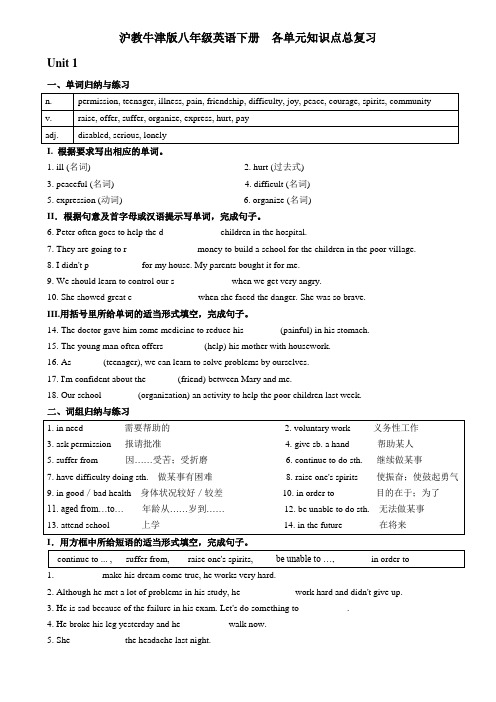
沪教牛津版八年级英语下册各单元知识点总复习Unit 1一、单词归纳与练习I. 根据要求写出相应的单词。
1. ill (名词) ____________________2. hurt (过去式) ____________________3. peaceful (名词) ____________________4. difficult (名词) ____________________5. expression (动词) ____________________6. organize (名词) ____________________ II.根据句意及首字母或汉语提示写单词,完成句子。
6. Peter often goes to help the d____________ children in the hospital.7. They are going to r_______________ money to build a school for the children in the poor village.8. I didn't p___________ for my house. My parents bought it for me.9. We should learn to control our s____________ when we get very angry.10. She showed great c______________ when she faced the danger. She was so brave.III.用括号里所给单词的适当形式填空,完成句子。
14. The doctor gave him some medicine to reduce his _______ (painful) in his stomach.15. The young man often offers ________ (help) his mother with housework.16. As ______ (teenager), we can learn to solve problems by ourselves.17. I'm confident about the ______ (friend) between Mary and me.18. Our school _______ (organization) an activity to help the poor children last week.二、词组归纳与练习I.用方框中所给短语的适当形式填空,完成句子。
人教八年级下册英语期末专项复习——词汇与句子(含答案)
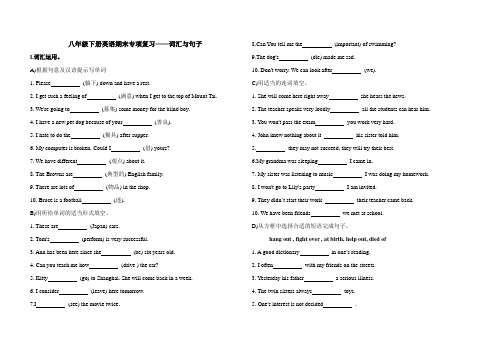
八年级下册英语期末专项复习——词汇与句子I.词汇运用。
A)根据句意及汉语提示写单词1. Please (躺下) down and have a rest.2. I get such a feeling of (满意) when I get to the top of Mount Tai.3. We're going to (募集) some money for the blind boy.4. I have a new pet dog because of your (善良).5. I hate to do the (餐具) after supper.6. My computer is broken. Could I (借) yours?7. We have different (观点) about it.8. The Browns are (典型的) English family.9. There are lots of (物品) in the shop.10. Bruce is a football (迷).B)用所给单词的适当形式填空。
1. These are (Japan) cars.2. Tom's (perform) is very successful.3. Ann has been here since she (be) six years old.4. Can you teach me how (drive ) the car?5. Kitty (go) to Shanghai. She will come back in a week.6. I consider (leave) here tomorrow.7.I (see) the movie twice. 8.Can You tell me the (important) of swimming?9.The dog's (die) made me sad.10. Don't worry. We can look after (we).C)用适当的连词填空。
中考英语复习 八年级(下) Units 1~2 人与社会—志愿服务与公共服务

D. How many kinds of volunteer jobs there are.
( B ) 2. What does the underlined word “motivated” mean in Paragraph 3?
A. creative B. active C. brave
D. smart
八年级(下) Units 1~2
By giving to others, you feel what is called “the helper's high”—a positive feeling. Volunteering can make you happier over time, too. 3题It has been shown to reduce feelings of worries, because many people find that they are moving away from their personal worries by paying much attention to the needs of others. “Volunteering also gives a chance to connect with people, which is good news for our spirit health,” says Jolie Goodman of the Mental Health Foundation. 5题Studies have shown that volunteering can improve your physical health, too.
1 阅读理解 2 任务型阅读 3 完形填空 4 语篇填空 5 补全对话
期末知识点复习课件2022-2023学年人教版英语八年级下册
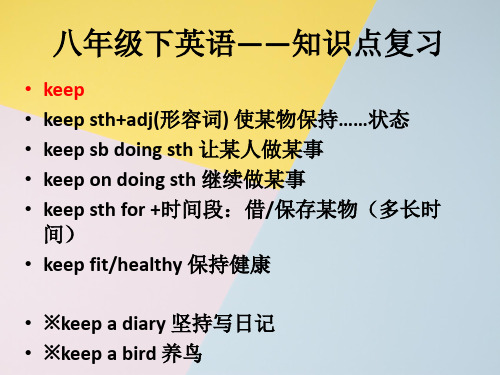
• 不定式 • learn to do sth 学会做某事 • encourage sb to do sth 鼓励某人做某事 • tell sb to do sth 告诉某人要做某事 • tell sb not to do sth 告诉某人不要做某事 • invite sb to do sth 邀请某人做某事 • invite sb not to do sth 邀请某人不做某事 • decide to do sth 决定做某事 • decide not to do sth 决定不做某事 • have to 必须don’t have to 不必 • try to do sth 尽力做某事 • try not to do sth 尽力不做某事
• so/such:如此…… • 用法如下: • such+名词短语 • so +形容词 • so many/much/few/little
• 一点儿 • a little 一点儿(修饰不可数名词和形容词) • a bit 一点儿(后接形容词) •
•
• put • put out 熄灭 • put on 穿上 • put off 下车 • put up 挂起、张贴 • put down 放下
八年级下英语——知识点复习
• keep • keep sth+adj(形容词) 使某物保持……状态 • keep sb doing sth 让某人做某事 • keep on doing sth 继续做某事 • keep sth for +时间段:借/保存某物(多长时
间) • keep fit/healthy 保持健康
• either…or…或者……或者……,连接两个主语时,谓 语动词在数的方面与or后面的主语保持一致。
中考英语复习人教版 八年级(下)重点词汇附答案
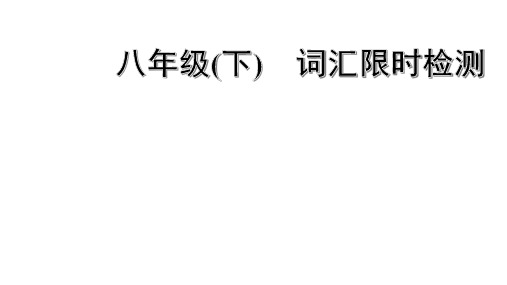
I always do housework at home. When I was in the 1.__t_h_ir_d___ (three) grade, I was asked to clean my bedroom. At first, I was very unhappy to do that, because I thought housework was a 2._n_a_t_u_r_a_l (nature) job of mom's. But one day, I saw my mom sleeping, looking tired. I 3.__r_e_a_li_z_ed__(realize) she had worked all day and still had to do much housework at home. After that, I made 4.___a___ decision to help with housework. I started to clean up my 5.__m_e_s_s_y_ bedroom
Passage 4 万唯原创 Last summer, I went to Qingdao with my parents.The sun 1.___sh__o_n_e__(shine) every day and the air was fresh, which made us so comfortable. We couldn't wait to go to the seaside foinrstthe 2.________ (one) day. I remcleeamrblyer 3.________(clear) when we were lying on the beach, we saw a little crab(螃蟹) walking towards us. I was so excited and played wiwthhiiltefor a 4.________. Because it was in summer, there wteorueriastlsot of 5.________(tourist) on the beach and in the seariends and talked to foreigners. I bought many 6.__in_t_e_r_e_s_ti_n_g__(interest) souvenirs for my friends. Besides, I picked some colorful shells. There we lived in an amazing hotel, and we were 7._p_r_o_v_i_d_e_d_(provide)with the firstclass service. I like Qingdao very much. The whole trip was so good that we relieved(释放) all the stress and enjoyed 8.__o_u__rs_e_l_v_e_s__(we). It is such 9.___a____ wonderful place. I have fallen 10. ___in_____ love with this coastal city and I hope to go there once more.
(必考题)初中英语八年级下册期末复习题(含答案解析)
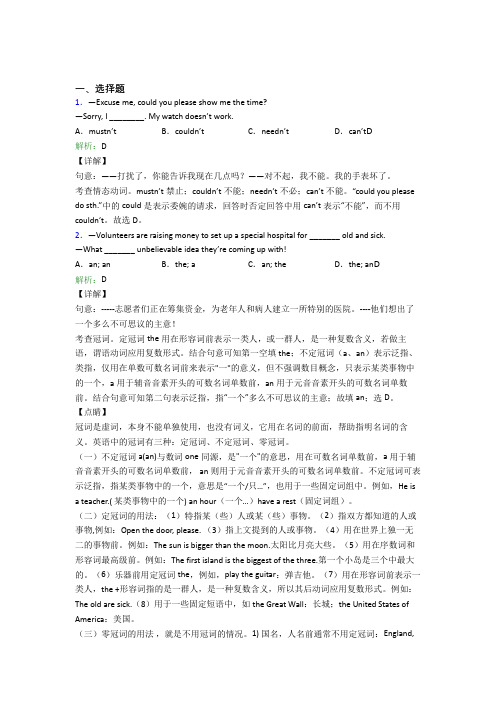
一、选择题1.—Excuse me, could you please show me the time?—Sorry, I ________. My watch doesn’t work.A.mustn’t B.couldn’t C.needn’t D.can’t D解析:D【详解】句意:——打扰了,你能告诉我现在几点吗?——对不起,我不能。
我的手表坏了。
考查情态动词。
mustn’t禁止;couldn’t不能;needn’t不必;can’t不能。
“could you please do sth.”中的could是表示委婉的请求,回答时否定回答中用can’t表示“不能”,而不用couldn’t。
故选D。
2.—Volunteers are raising money to set up a special hospital for _______ old and sick. —What _______ unbelievable idea they’re coming up with!A.an; an B.the; a C.an; the D.the; an D解析:D【详解】句意:-----志愿者们正在筹集资金,为老年人和病人建立一所特别的医院。
----他们想出了一个多么不可思议的主意!考查冠词。
定冠词the用在形容词前表示一类人,或一群人,是一种复数含义,若做主语,谓语动词应用复数形式。
结合句意可知第一空填the;不定冠词(a、an)表示泛指、类指,仅用在单数可数名词前来表示"一"的意义,但不强调数目概念,只表示某类事物中的一个,a用于辅音音素开头的可数名词单数前,an用于元音音素开头的可数名词单数前。
结合句意可知第二句表示泛指,指“一个”多么不可思议的主意;故填an;选D。
【点睛】冠词是虚词,本身不能单独使用,也没有词义,它用在名词的前面,帮助指明名词的含义。
英语中的冠词有三种:定冠词、不定冠词、零冠词。
初中英语 人教版八年级下册期末总复习(讲练+习题含答案,共104张PPT)

3. I think there will be more / less pollution. 我认为将会有更多/更少的污染。
fewer与less及more表数量的用法。
(3)many“许多”,修饰可数名词。 much“许多”,修饰不可数名词。
many / much比较级、最高级为不规则变化:many / much-more-most
“a few”表示“一些”+可数名词
例:a few days ago, for a few weeks, He has few friends here. There will be fewer trees.
3. I think there will be more / less pollution. 我认为将会有更多/更少的污染。
He went home after two days. 他两天后回家了。 Three years later,she had a baby. 三年后,她生了一个婴儿。
fall in love with 爱上… fall in love with a girl 爱上一个女孩 fall in love with a country 爱上一个国家
例:I have many magazines. She has more magazines. But he has the most. There will be more people on the earth in future. More and more students start to exercise more every day to keep fit.
典例展示 2.About Pollution
Tina: There is much pollution around us.
人教版八年级下册英语期中复习资料范文.doc

人教版八年级下册英语期中复习资料期中考试将至,那么八年级的同学应该怎样进行英语的复习准备呢?想要考取高分,就要找好复习资料。
下面是由我整理的,一起来看看吧。
第一部分1.Some people might ask how this cartoon animal became so popular.有些人可能会问这个卡通动物怎样变得如此受欢迎了呢。
2.Mickey was like a common man, but he always tried to face any danger. Mickey.象一个普通人,但是他总是努力面对任何危险。
3.Mickey was unlucky and had many problems such as losing his house or girlfriend.Mikey是不幸的,总是面对很多问题,如失去房子或女朋友等。
4.However, he was always ready to try his best.然而,他总是准备尽最大努力。
5.Most of them wanted to be like Mickey.他们大多数都想象Mickey一样。
6.On November 18, 1978, Mickey became the first cartoon character to have a star on the Hollywood Walk of Fame.1978年11月18日,Mickey 成为在好莱坞星光大道上拥有一颗星星的第一个卡通形象。
7.Today’s cartoons are usually not so simple as little Mickey Mouse, but everyone still knows and loves him.今天的卡通通常都不如Mickey Mouse那样简单,但是人人都知道他,热爱他。
8.Who has a pair of ears more famous than Mickey’s?谁有一双比Mickey的耳朵更闻名于世的呢?9.I think those movies are so meaningless.我认为那些电影如此地毫无意义。
Unit8-八年级英语下册复习手册(人教版)

Unit 8 Have you read treasure island yet?◆短语归纳1.on page 25 在第25页2. the back of the book 书的背面3. hurry up 赶快;匆忙. in two weeks 在两周之内5. go out to sea 出海6. an island full of treasures一个满是宝藏的岛屿7. w rite about 写作关于……的内容8. finish doing sth. 做完某事9. wait for another ship 等待另一艘船到来10. learn to do sth. 学会做某事11. grow fruits and vegetables 种水果和蔬菜12. a few weeks ago 几个星期前13. the marks of another man’ s feet另一个人的脚印14. not long after that 不久之后15. run towards sp. 跑向某地16. use...to do sth. 用……来做某事17. signs left behind by someone某人留下的标记18. read the newspaper 看报19. science fiction 科幻小说20. can’ t wait to do sth. 迫不及待地做某事21. a good way to wake up 醒来的一个好办法22. number of people 人数23. used to do sth. (过去)常常做某事24. study abroad 在国外学习25. make sb. do sth. 使某人做某事26. come to realize 开始意识到27. ever since then 自从那时起28. the southern states of America美国的南部地区29. belong to 属于30. be kind to each other 善待彼此31. trust one another 互相信任32. the beauty of nature 大自然的美33. have been to sp. 去过某地34. do some research on sth. 对……做研究35. hope to do sth. 希望做某事36. see sb. do sth. 看到某人做某事37. the firs t line in the song歌曲的第一行38. enjoy success in享受……的成功39. at the end of the day傍晚的时候◆ 典句必背1.— Have you read little Women yet? 你读过《小妇人》吗?— Yes,I have. /No,I haven\\ t. 是的,我读过。
新人教八年级英语下册单元复习及周末同步辅导资料(八下Unit 1)

新人教八年级英语下册单元复习及周末同步辅导资料Unit 1 What’s the matter?一、基础知识1. What’ s the matter? 怎么啦?出什么事情了?【解析】matter/ ' mætə(r)) /n.问题;事情What’ s the matter with you?= What’s the trouble with you? = What’ s wrong with you? 你怎么了?【注】:matter 和trouble 为名词,其前可加the 或形容词性物主代词,wrong 是adj. 不能加the 【用法】用于询问某人有什么病或某人遇到什么麻烦、问题其后跟询问对象时,与介词with连用。
即:What’s the matter with sb.? = What’s your trouble? = What’s up? = What happens to sb.?—What’s the matter with you ?— I have a bad cold.2. I had a cold.我感冒了。
have a cold = catch a cold = have the flu感冒have a fever 发烧have a cough咳嗽have a stomachache胃疼,肚子疼have a toothache牙疼have a headache头疼3. 身体部位+ache(疼痛)构成新的复合词stomach+ache=stomachache head+ache=headachetooth+ache=toothache back+ache=backache后背痛4. much too+形容词,意为“太...... ”;too much +名词,意为“很多,大量”。
5. enough 足够的/地,enough通常放在名词前,形容词、副词之后。
人教版八年级下册英语必考知识点梳理(期末复习必备)

人教版八年级下册英语必考知识点梳理(期末复习必备)八年级下册英语知识点Unit 1 What’s the matter?【重点短语】1.have a fever 发烧2.have a cough 咳嗽3.have a toothache 牙疼4.talk too much 说得太多5.drink enough water 喝足够的水6.have a cold 受凉;感冒7.have a stomachache 胃疼8.have a sore back 背疼9.have a sore throat 喉咙痛10. take risks 冒险11.hot tea with honey 加蜂蜜的热茶12.see a dentist 看牙医13.get an X-ray 拍X 光片14.take one’s temperature 量体温15.put some medicine on sth. 在……上面敷药16. give up 放弃17. sound like 听起来像18. all weekend 整个周末19. in the same way 以同样的方式20. go to a doctor 看医生21. go along 沿着……走22. on the side of the road 在马路边23. shout for help 大声呼救24. without thinking twice 没有多想25. get off 下车26. have a heart problem 有心脏病27. to one’s surprise 另某人惊讶的是28. thanks to 多亏了;由于29. in time 及时30. make a decision 做出决定31. get into trouble 造成麻烦32. right away 立刻;马上33. because of 由于34. get out of 离开;从……出来35. keep on doing sth. 继续或坚持做某事36. put a bandage on sth. 用绷带包扎37. fall down 摔倒38. feel sick 感到恶心39. have a nosebleed 流鼻血40. cut his knee 割伤他的膝盖41. put her head back 把她的头向后仰42. have problems breathing 呼吸困难43. mountain climbing 登山运动44. be used to doing sth. 习惯做某事45. run out (of) 用完;用尽46. so that 以便47. so...that... 如此……以至于...…48. be in control of 掌管;管理49. in a difficult situation 在闲境中【重点句型】1. What's the matter with you?= What'the trouble with you? = What's wrong with you? 你怎么了?2. What should she do? 她该怎么办呢?3.Should I take my temperature? 我应该量一下体温吗?4.You should lie down and rest. 你应该躺下休息一会儿。
广州牛津版英语八年级下册总复习资料

广州版八年下册英知点U1 复1.在⋯⋯at the age of2.代替 in place of/ instead of3.付出代价at a price4.某事感谢某人 be grateful/thankful to sb for sth5.播放的 on television6.某人要求格be strict with sb7.上琴 take/have piano lessons8.病倒 fall ill9.⋯⋯be responsible for10.从那起 from then on11.放弃 give up12. 我代的of our time(s)13.得 win/get/receive an award (for sth.)14.玩得快乐 have fun15.得一个机遇 get a chance16.表演,演出give a performance17.比方 such as xK b1 . Co m18.在多大型活 at many huge events19.激励某人做某事 encourage sb to do sth20.西方古典音 Western classical music21.琴天才 piano prodigy22.⋯⋯感觉好奇 be curious about23. an experiment on关⋯于⋯ 的24.找、考虑 search for25.使生 ;致 lead to (led pt.)26.倦; (做某事 )be tired of doing sth27.保⋯⋯省得⋯⋯ protect⋯from sth28.被称⋯⋯ ;被称作⋯⋯ be known as⋯29.因⋯人所知 be known for30.在他的一世中 during his lifetime二、responsibility (n.) -- responsible (adj.)piano (n.) -- pianist (n.)prodigious (adj.) -- prodigy (n.)stun (n.) -- stunning (adj.)west (n.) -- western (adj.)classic (n.) -- classical (adj.)music (n.) -- musical (adj.)compete (v.) -- competition (n.) 一、短31.使某人 / 某物怎 make sth./sb. + adj.32.建立;建 set up33.是、素来 is/ was always doing34.同 at the same time35.认识 learn about36.出生在某地 be born in37.与⋯没关 have nothing to do with38.意味着做某事 meaning doing sth39.打看作某事 mean to do40.在做⋯⋯方面有天 have a gift for doing sth41.持做⋯⋯ keep doing sth.42.出于 for love43. 不再想某人;不再把某人放在心上forget about sb44.得了吧 come on45.蓄; save up46.靠某人自己 on one’s own47.帮助某人 give sb a hand48.共同的,共有的 in common49. 与⋯⋯相同 be equal to 新课标第一网50. 足⋯⋯ 致使于能做某事be adj. enough(for sb) to do⋯51. 太⋯致使于不能够做某事 be+ too+ adj.+ to do sth.52.⋯⋯生趣 become interested in53.;数 in total=in all54.史上 in history55.⋯⋯方面的家 an expert on/at/in⋯56.⋯⋯而 fight for ⋯57.反⋯⋯而 fight against ⋯58.供应帮助 offer to help59.被是⋯⋯ be regarded as⋯60.从⋯⋯退休 retire from ⋯succeed (v.) -- success (n.) -- successful (adj.)sudden (adj.) -- suddenly (adv.)perform (v.) -- performance (n.)encouragement (n.) -- encourage (v.)talent (n.) -- talented (adj.)invent (v.) -- inventor (n.) -- invention (n.)curiosity (n.) -- curious (adj.)nature (n.) -- natural (adj.) -- naturally (adv.)improve (v.) -- improvement (n.) science (n.) -- scientist (n.) equip (v.) -- equipment (n.)find (v.) -- finding (n.)actual (adj.) -- actually (adv.) develop (v.) -- development (n.) efficiency (n.) -- efficient (adj.) include (v.) -- including (prep.) pave (v.) -- pavement (n.) manage (v.) -- manager (n.) intelligence (n.) -- intelligent (adj.) confidence (n.) -- confident (adj.) bravery (n.) -- brave (adj.) determine (v.) -- determined (adj.) design (v.) -- designer (n.)三、法1.I couldn t ’agree more. 我再赞成不了。
八年级下册英语人教版期末单元基础知识点复习unit 1
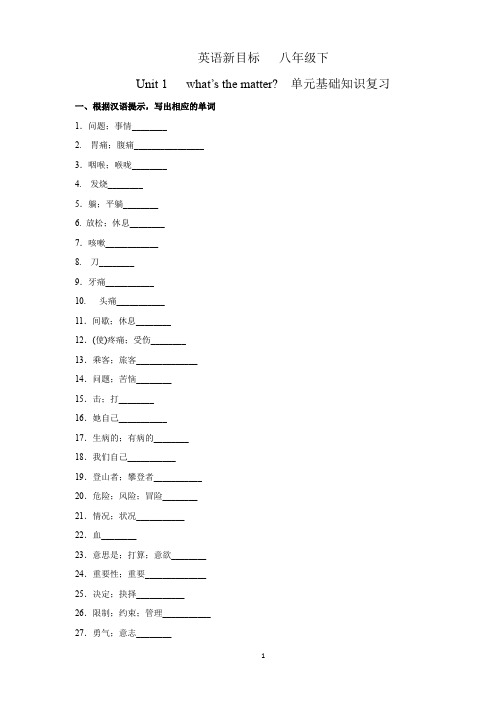
英语新目标八年级下Unit 1 what’s the matter? 单元基础知识复习一、根据汉语提示,写出相应的单词1.问题;事情________2. 胃痛;腹痛________________3.咽喉;喉咙________4. 发烧________5.躺;平躺________6. 放松;休息________7.咳嗽____________8. 刀________9.牙痛___________10. 头痛___________11.间歇;休息________12.(使)疼痛;受伤________13.乘客;旅客______________14.问题;苦恼________15.击;打________16.她自己___________17.生病的;有病的________18.我们自己___________19.登山者;攀登者___________20.危险;风险;冒险________21.情况;状况___________22.血________23.意思是;打算;意欲________24.重要性;重要______________25.决定;抉择___________26.限制;约束;管理___________27.勇气;意志________28.死;死亡________二、单元语法情态动词shouldshould属情态动词, 后接动词原形, 没有人称和数的变化。
用于提出建议劝告别人。
should的否定形式为should not, 通常缩写为shouldn’t。
1. — Tom, I have a toothache. 汤姆, 我牙痛。
— You should see a dentist. 你应当去看牙医。
2. — I’m not feeling well these days. I have bad cough. 这些天我身体不适, 老是咳嗽。
— You shouldn’t smoke so much, I think. 我认为你不该抽这么多烟。
新目标人教版初中英语八年级下册课文复习全套资料
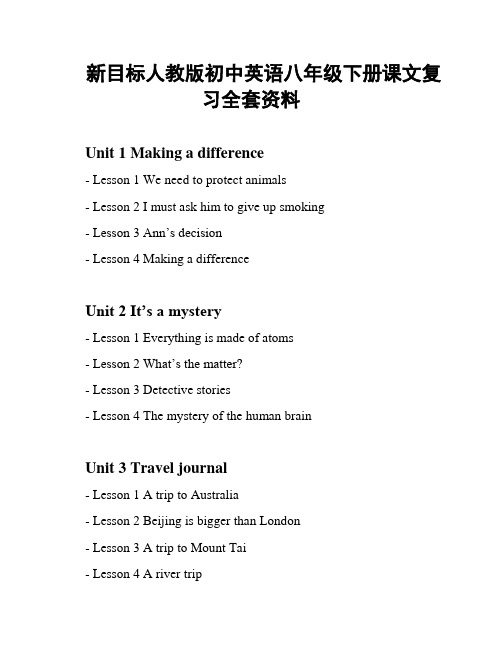
新目标人教版初中英语八年级下册课文复习全套资料Unit 1 Making a difference- Lesson 1 We need to protect animals- Lesson 2 I must ask him to give up smoking- Lesson 3 Ann’s decision- Lesson 4 Making a differenceUnit 2 It’s a mystery- Lesson 1 Everything is made of atoms- Lesson 2 What’s the matter?- Lesson 3 Detective stories- Lesson 4 The mystery of the human brainUnit 3 Travel journal- Lesson 1 A trip to Australia- Lesson 2 Beijing is bigger than London- Lesson 3 A trip to Mount Tai- Lesson 4 A river tripUnit 4 Music- Lesson 1 Sounds of music- Lesson 2 We’re trying to find a boy band- Lesson 3 A famous orchestra- Lesson 4 Music in our heartsUnit 5 Amazing stories- Lesson 1 A greener future- Lesson 2 I used to be afraid of the dark- Lesson 3 Pygmalion- Lesson 4 Amazing sports storiesUnit 6 Films and TV programmes- Lesson 1 TV programmes- Lesson 2 What’s on?- Lesson 3 Jurassic Park- Lesson 4 Harry Potter and the Philosopher's StoneUnit 7 Teenagers should be allowed to choose their own clothes- Lesson 1 Children should be allowed to grow up freely- Lesson 2 Uniforms or casual clothes?- Lesson 3 Different styles- Lesson 4 Fashion and societyUnit 8 Helping others- Lesson 1 Offering help- Lesson 2 First aid- Lesson 3 Volunteers- Lesson 4 A charity show这份全套资料包含了新目标人教版初中英语八年级下册的每个单元以及它们各自包含的四节课。
最新人教版英语八年级下册期末复习各单元知识点总复习
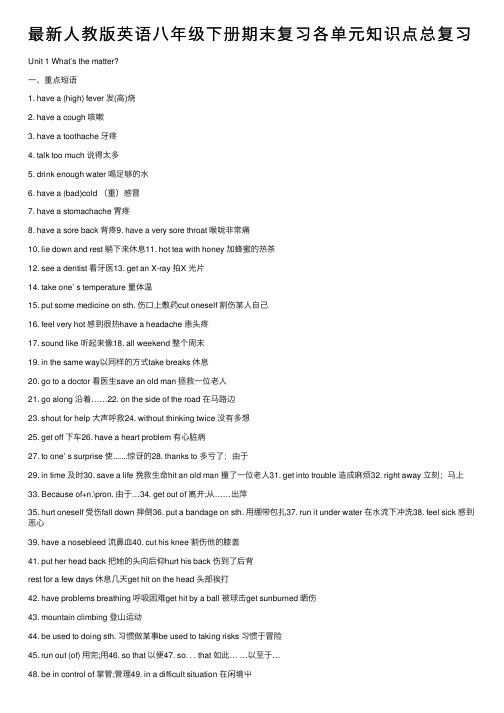
最新⼈教版英语⼋年级下册期末复习各单元知识点总复习Unit 1 What’s the matter?⼀、重点短语1. have a (high) fever 发(⾼)烧2. have a cough 咳嗽3. have a toothache ⽛疼4. talk too much 说得太多5. drink enough water 喝⾜够的⽔6. have a (bad)cold (重)感冒7. have a stomachache 胃疼8. have a sore back 背疼9. have a very sore throat 喉咙⾮常痛10. lie down and rest 躺下来休息11. hot tea with honey 加蜂蜜的热茶12. see a dentist 看⽛医13. get an X-ray 拍X 光⽚14. take one’ s temperature 量体温15. put some medicine on sth. 伤⼝上敷药cut oneself 割伤某⼈⾃⼰16. feel very hot 感到很热have a headache 患头疼17. sound like 听起来像18. all weekend 整个周末19. in the same way以同样的⽅式take breaks 休息20. go to a doctor 看医⽣save an old man 拯救⼀位⽼⼈21. go along 沿着……22. on the side of the road 在马路边23. shout for help ⼤声呼救24. without thinking twice 没有多想25. get off 下车26. have a heart problem 有⼼脏病27. to one’ s surprise 使.......惊讶的28. thanks to 多亏了;由于29. in time 及时30. save a life 挽救⽣命hit an old man 撞了⼀位⽼⼈31. get into trouble 造成⿇烦32. right away ⽴刻;马上33. Because of+n.\pron. 由于…34. get out of 离开;从……出萍35. hurt oneself 受伤fall down 摔倒36. put a bandage on sth. ⽤绷带包扎37. run it under water 在⽔流下冲洗38. feel sick 感到恶⼼39. have a nosebleed 流⿐⾎40. cut his knee 割伤他的膝盖41. put her head back 把她的头向后仰hurt his back 伤到了后背rest for a few days 休息⼏天get hit on the head 头部挨打42. have problems breathing 呼吸困难get hit by a ball 被球击get sunburned 晒伤43. mountain climbing 登⼭运动44. be used to doing sth. 习惯做某事be used to taking risks 习惯于冒险45. run out (of) ⽤完;⽤46. so that 以便47. so. . . that 如此… …以⾄于…48. be in control of 掌管;管理49. in a difficult situation 在闲境⼬lose one’s life 丧命cut off half his right arm 切除半边右臂bandage himself 给他⾃⼰包扎50. keep on doing sth. 继续或坚持做某事51. make a decision 做出决定the importance of making decision做决定的重要性52. take risks 冒险go mountain climbing 去爬⼭53. give up 放弃have a serious accident 遇到严重的意外54. talk about health problems谈论健康问题55. give advice 提建议⼆、重点句型1. What’ s the matter?What’ s the matter(with you)?= What’s the trouble (with you)?= What’ s wrong with you?你怎么了?I have a stomachache. 我肚⼦疼。
人教版八年级英语下册复习知识点

人教版八年级英语下册复习知识点八年级英语下册复习知识1What were you doing when the rainstorm came?1. arrive at 到达(小地方)arrive in到达(大地方)reach 到达get to 到达I arrived in Beijing last night. = I reached Beijing last night .= I got to Beijing last night .如果宾语是副词here, there, home, 要把at/in/to省略。
arrive here/there/homeget here/there/home2. in front of… 在… 的前面 (某一范围外的前面)in the front of … 在… 的前面(某一范围内的前面)There are some big trees in front of the classroom building. 在教室的前面有一些大树。
I like sitting in the front of the taxi. 我喜欢坐在出租车的前排位置。
3. take off(1)起飞When did the plane take off yesterday? 飞机什么时候起飞?(2)脱下(衣帽等)He took off his coat as soon as he went into the room. 他一进房间就脱掉了外套。
(3)取消They will take off the 5 am train . 他们取消了早上5点的火车。
4. get out (of ) … 从……离开/出去/下来A car stopped and a girl got out of it.但从汽车/火车/船/飞机/马匹上下来, 用get off…5. follow(1)跟随 I followed him up he hill. 我跟着他上了山.(2)沿着……前进 Follow this road until you get to the post office. 顺着这条路一直到邮局.(3)听懂,理解Could you speak more slowly? I can’t follow you. 你能说慢点吗?我听不懂。
八年级英语人教版(新目标)(最新版)下学期期末复习一
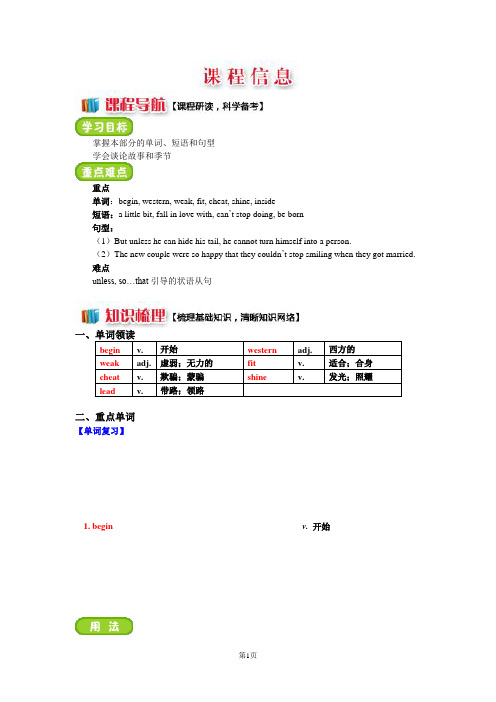
掌握本部分的单词、短语和句型学会谈论故事和季节重点单词:begin, western, weak, fit, cheat, shine, inside短语:a little bit, fall in love with, can’t stop doing, be born句型:(1)But unless he can hide his tail, he cannot turn himself into a person.(2)The new couple were so happy that they couldn’t stop smiling when they got married.难点u nless, so…that引导的状语从句begin v. 开始western adj. 西方的weak adj. 虚弱;无力的fit v. 适合;合身cheat v. 欺骗;蒙骗shine v. 发光;照耀lead v. 带路;领路二、重点单词【单词复习】1. begin v. 开始其过去式为began。
后面跟名词、动名词或动词不定式,接动名词和不定式无意义区别。
同义词是start。
When did he begin learning English? =When did he begin to learn English?他什么时候开始学英语的?begin with 以……开始beginning n. 开始,可构成短语:at the beginning of 在……之初Let’s begin the meeting with a happy song.让我们以一首欢快的歌曲开始会议。
At the beginning of this term, we made plans to study hard.在这学期之初,我们就制定了计划要努力学习。
My mother ____________ cooking half an hour ago.A. startsB. startingC. beginsD. began答案:D思路分析:根据half an hour ago可知时态用一般过去时。
2023年新人教版八年级英语下册各知识点归纳总结

秋新人教版八年级英语下册各知识点归纳总结Unti1 what’s the matter?短语归纳1.too much 太多2.lie down 躺下3.get an X-ray 做个X光检查4.take one ’s temperature 量体温5.put some medicine on ......在....上敷药6.have a fever 发热7.take breaks /take a break 休息8.without thinking twice 没多想9.get off 下车10.take sb to the hospital 送某人去医院11.wait for等待12.to one’s surprise 使.......惊讶旳thanks to多亏于;由于14.in time及时15.think about 考虑16.have a heart problem患有心脏病17.get into the trouble 碰到麻烦18.do the right thing做对旳旳事情事情19.fall down 摔倒20.put ...... on sth把...放在某物上21.get hit/sunburned 摔伤/烧伤22.be interested in 对.....感爱好23.be used to 习惯于.... 24.take risks/take a risk 挑战25.lose one’s life 失去生命26.because of 由于27.run out of 用完28.cut off 切除29.get out of 从...出来30.make a decision/decisions 做决定31.be in control of 掌管;管理32.give up 放弃使用方法归纳1.need to do sth .需要去做某事2.see sb doing sth 看见某人正在做某事3.ask sb sth 问询某人某事4.expect sb to do sth 期望某人做某事5.agree to do sth 想要做某事6.help sb (to) do sth 协助某人做某事7.want to do sth 想要做某事8.tell sb to do sth 告诉某人做某事9.have problems(in) doing sth 做某事有困难e sth to do sth用某物去做某事11.be/get used to doing sth 习惯于做某事12.seem to do sth 仿佛做某事13.keep on doing sth 继续做某事14.mind doing sth 介意做某事语法点1.问询某人旳健康问题及碰到麻烦旳体现措施2.情态动词should旳使用方法情态动词should旳使用方法表达劝说与提议,也表义务与责任第一人称问句中,征询提议要记清3.不定代词旳使用方法有关阅读措施推理判断阅读法精细解读1. What’s the matter (wi th you)? 怎么了?出什么事了?What’s the trouble/ the problem / wrong with sb./ sth.?2. I had a cold.我感冒了。
牛津译林版英语八年级下册期末复习第五单元知识点梳理Goodmanners

get wet打湿
be caught in the rain被阻于雨中
be caught under a big stone被压于大石下
all of sudden突然
be busy doing something忙于做……
be busy with something忙于做……
leave somebody / something somewhere把某人/某物留在某地
It got water all over me.它弄了我一身水。
It felt so good to be home.在家感到如此棒。
No wonder you didn’t make it to the petition.难怪你没有来参加比赛。
四.重点语法
enough to的用法
“be+adj./adv.+enough to do sth.”结构常用来描述一个人的个性、品格和能力。该结构可以用so... that句型进行替换。如:
牛津译林版英语八年级下册 期末复习
第5单元知识点梳理:Good manners
8B Unit5 Good manners
一.重点单词
1.turn n.
[考点点拨] turn作名词,意为“轮流,(轮流的)顺序”。
It's one's turn to do sth.轮到某人做某事了。如:
It's my turn to clean the blackboard.
Chinese is not too difficult to learn.汉语绝不难学。
One is never too old to learn.活到老,学到老。
- 1、下载文档前请自行甄别文档内容的完整性,平台不提供额外的编辑、内容补充、找答案等附加服务。
- 2、"仅部分预览"的文档,不可在线预览部分如存在完整性等问题,可反馈申请退款(可完整预览的文档不适用该条件!)。
- 3、如文档侵犯您的权益,请联系客服反馈,我们会尽快为您处理(人工客服工作时间:9:00-18:30)。
八年级下复习资料◆unit 1 Will people have robots?目标语言:Make predictions重点句型:People won’t use money. Everything will be free.Books will only be on computers, not on paper.Kids won’t go to school. They’ll study at home on computer.There will only be one country.People will live to be 200 years old.Will people use money in 100 years? No, they won’t.There will be more people.There will be less free time.There will be fewer cars.There will be less pollution.There will be fewer trees.I agree.What do you think Sally will be in five years?I think she will be a doctor.Where do you live? I live in an apartment.知识点:1.形容词,副词的比较等级考查热点透视:a) 表示A与B在程度上相同时,“as+形容词或副词的原级+as”结构。
表示A 不如B时,可用“not as/so+形容词或副词的原级+as”结构。
b) 表示A比B在程度上“更…..”时,可用“形容词或副词的比较级+than”结构c) 表示三者或三者以上的比较,其中一个在程度上“最…..”时,常用“the+形容词或副词的最高级”结构,后面可带“of/in的短语”来说明比较的范围。
(注意:副词的最高级在句中常省略“the”.)d) 在形容词或副词的比较级前,可以用“a little, even, far, much,still”的等词语来修饰,以加强语气。
e) 表示“越来越….”时,常用“形容词或副词的比较级+and+形容词或副词的比较级”结构,但要注意,对于多音节和部分双音节形容词,副词而言,若要表达此意时,要用“more and more+形容词或副词的原级“结构。
f) 在表示“其中最….之一“的含义时,常使用“one of+the+形容词最高级形式+名词复数”结构,其中的定冠词the不可以省略。
g) 如果强调“两者中比较…的(一个)”的意思时,可使用“the+形容词比较级+其它”结构。
h) 表示“越….越….”, 可使用“the+形容词或副词的比较级,the+形容词或副词的比较级”结构。
2.几个相似的“It句型”a) It’s +adj.+ that从句:在该句型中,it代替that从句,形容词用来说明that从句内容的性质。
如,It’s polite that you always give seats to the elderly on the bus.b) It’s +adj.+to do sth.在该句型中,it代替to do sth的内容,形容词用来说明to do sth的性质。
如,It’s useful to remember lots of words before the exams.c) It’s +adj.+for sb. to do sth.在该句型中,it代替to do sth的内容,形容词用来强调to do sth就sb而言的性质(常见的形容词有possible, important, necessary, difficult)d) It’s +adj.+of sb. to do sth.在该句型中,it代替to do sth.的内容,形容词用来强调of后所接宾语本身的性质(常见的形容词有kind, rude, clever, foolish, polite).3.一般将来时a) 一般将来时的构成:由助动词shall或will加动词原形构成,shall用于第一人称。
在口语中,will在名词或代词后常简略为’ll,will not常简略为won’t。
这个时态的肯定,否定和疑问结构可表示如下:肯定句否定句疑问句I (We)shall(will) go.You(He, She, They) will go. I(We)shall(will) not go.You(He, She, They)will not go. Shall I(we) go?Will you (he, she, they) go?用”be going to +动词原形”也可表示将来时,表示将要发生的事,打算或决定要做的事。
I think it is going to snow.我看要下雪。
b)一般将来时的用法:1)表示将要发生的动作或情况;2)不以人的意志为转移,肯定要发生的事情。
The day after tomorrow will be National Day.后天是国庆日。
4. in/after:in是指以现在时间为起点的“在一段时间以后”。
也可以表示“在将来多少时间之内”,句子中的谓语动词要用一般将来时态;after常指以过去时间为起点的“一段时间之后”,所以它与过去时态连用。
当after指某个特定的未来时刻或日期之后,或指以将来某一时间为起点的若干时间之后时,它可以与将来时态连用。
5.more, less, fewer的用法区别:more为many, much的比较级,意为“更多”,可修饰可数与不可数名词。
Less是little的比较级,意为“更好,较少”,修饰不可数名词。
Fewer是few的比较级,意为“更少”,修饰可数名词复数。
【注意】few, little表示否定“几乎没有”。
a few, a little表示肯定“一点,几个”。
如,Because he often stays at home, he has few friends.6.there be与have的区别:1)含义不同。
there be表示的是“某地(时)有某人(物)”,强调“存在关系”。
Have则表示“某人(物)所有”,强调“所属关系”。
如,There is a bus in your factory.(公共汽车不一定属于我们厂所有)Our factory has a bus.(公共汽车属于我们厂所有)2)句型不同。
there be句型为“There be +某人(物)+某时(地)”;have 句型为“某人(物)+have(has)+某物(人)。
如There isn’t a cat under the chair. She doesn’t have two brothers.3)当表示某物的构成和组成部分时,用there be和have 均可。
如,Our school has sixty classes.= There are sixty classes in our school.我们学校有60个班。
【注意】there be句型中有两个或多个并列主语时,须根据就近原则,be与最靠近的主语在数上保持一致。
如,There are two eggs and a cup of milk on the table.There be句型的将来时表达方式:肯定:There will be…否定:Th ere won’t be…一般疑问句:Will there be….? Yes, there will. No, there won’t.7. be worth doing值得;be worthy of doing, be worthy to do值得8.Seem的用法:1)seem to do似乎…He seems to think so.2)It seems that看来…It seems that he is lying. 3) seem +adj./n.好象是… He seems ill.9.would like sth意思为“想要某物“;would like to do意思为”想要做某事“。
回答would like句型的一般疑问句时,其肯定回答为“Yes, please.”;否定回答“No, thanks”或“I’d like /love to, but….”10.make sb. do; make +n+adj.; make friends with sb.; make +n./ pron.+n.11. Such作形容词,意思是“如此的”“这样的”,修饰各种名词。
Such这样的。
如It is such bad weather.天气如此恶劣。
⌝Such常和as搭配,表示一种类别。
如We enjoy such a voice as hers.我们喜欢象她那样的嗓子。
⌝Such常和表示结果的that从句搭配,表示“如此….以至于…”如⌝It was such a hot day that we all had to stay at home.Such…that…和so…that…都可用来引出一个结果状语从句。
由于such是形容词,所以that从句前有一个受such修饰的名词;而so 是副词,用以修饰形容词或副词,因此that从句前一般不出现名词。
如⌝They are such kind-hearted teachers that people in the village all respect them.The exam was so difficult that many students failed to pass it.a) 如果名词是可数名词的单数形式,such和so的位置不同:such+a/an+形容词+单数名词so+形容词+a/an+单数名词b) 如果名词是不可数名词或名词复数,只可用such,不能用so.:such+形容词+不可数名词或复数名词c) 如果被修饰的不可数名词被much, little, 或复数名词被many, few等表示量的形容词修饰时,用so,不用such.d) 当little表示“年纪小的”时,可用such+little+名词There were such little children that they couldn’t clean the room.12. people, person, folks, human: people“人们“全体;person “人”(不分年龄,性别它包括men, women, children.它可做people的单数形式可以说every person但不能说one people. Person指“人们”时着重个体;folks“人们”,指一般人或特殊年龄位置,境遇等特殊级的人;human主要用来区别于其他动物。
